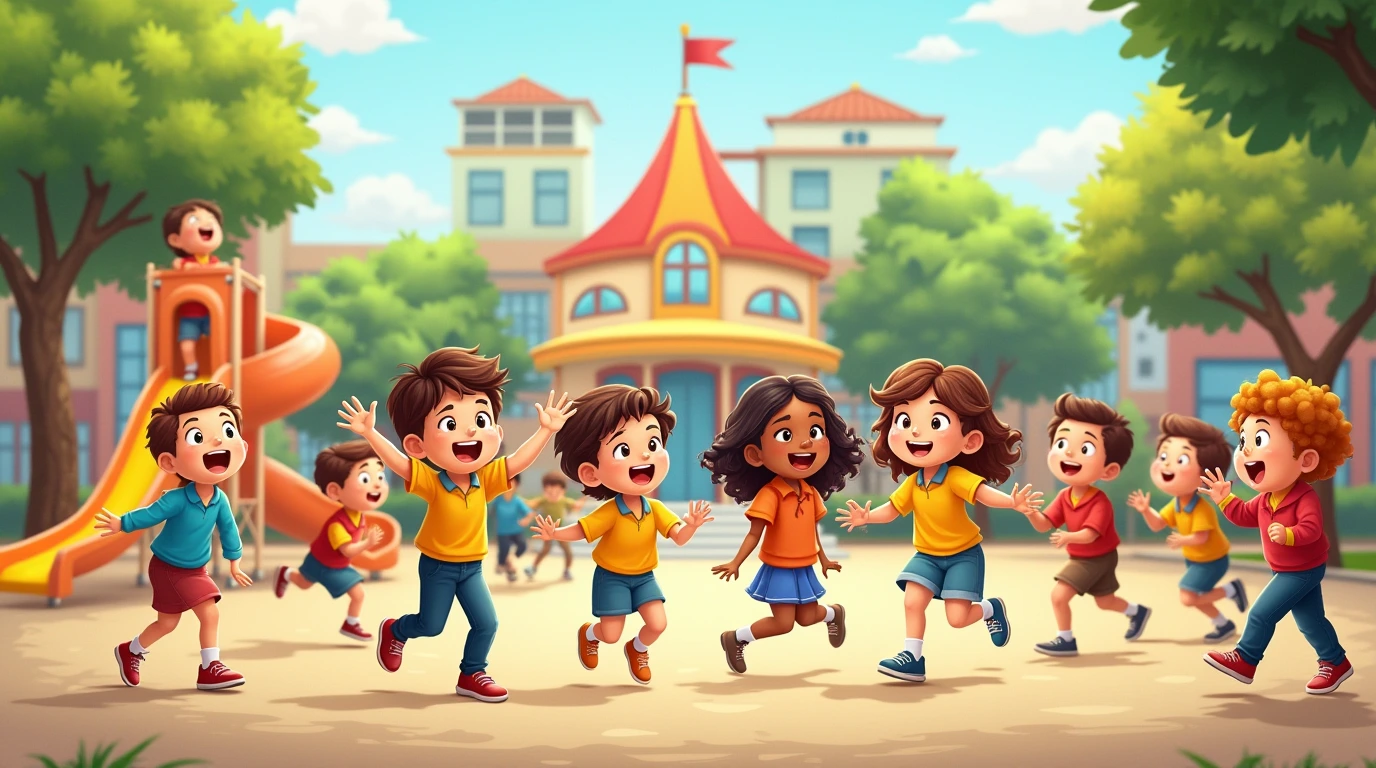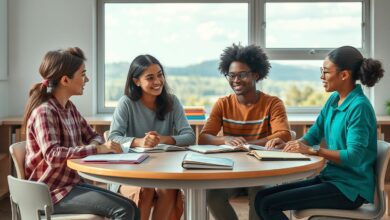School Games: Boost Student Skills & Engagement

Table of Contents
Educational games help motivate students and develop their skills. They combine fun with learning, making learning effective. These games help develop cognitive, physical, and social abilities.
There are traditional and modern school activities aimed at improving student skills. These games reflect an innovative way to teach students. They help break the traditional study routine and create a positive learning environment.
The Importance of School Games in Developing Student Skills

School games help develop student skills. They aren’t just for entertainment; they are an important educational tool.
Enhancing Cognitive Abilities
Games enhance students’ cognitive abilities. Through them, the following improve:
- Critical thinking skills
- Problem-solving ability
- Quick wit and focus
Developing Social Skills
Group games enhance students’ social skills. Through them, they learn:
- Collaboration among peers
- Effective communication
- Respect for teamwork rules
Improving Physical Fitness
Sports games improve students’ physical fitness. Through them, they increase:
- Physical activity
- Development of motor skills
- Enhancing physical and mental health
School games are not just a recreational activity; they are a real investment in a student’s future.
School Games for Primary School
Primary school games are very important in children’s basic education. These games help develop their skills in a fun way. They attract primary school pupils.
There are different games for the primary stage. These games focus on developing the child’s abilities:
- Educational games that help acquire basic knowledge
- Active games that promote physical activity
- Intelligence games that develop thinking skills
These school games aim to:
- Stimulate learning interactively
- Develop communication skills
- Boost self-confidence
| Game Type | Skills Developed | Age Group |
|---|---|---|
| Language games | Reading and writing skills | 6-9 years |
| Arithmetic games | Logical thinking skills | 7-10 years |
| Social games | Cooperation and communication skills | 5-8 years |
Educational games are a bridge connecting fun with learning in a child’s world.
Teachers should choose appropriate games. They should be compatible with children’s activities in primary education. Individual differences among pupils should be considered.
Educational Games for Improving Arabic Language Skills
Language games are a fun way to learn Arabic. They help develop reading and writing skills easily.
Letter and Word Games
Letter and word games emphasize fundamental language skills. Teachers use various strategies to make language learning enjoyable:
- Word building game from jumbled letters
- Spelling contests for difficult words
- Hidden word search game
These games help students gradually improve their skills.
Interactive Reading Competitions
Interactive reading competitions encourage students to learn the language. They can be organized in various ways:
| Competition Type | Educational Goal |
|---|---|
| Group story reading | Developing comprehension and pronunciation skills |
| Acting out a scene from a literary text | Enhancing understanding of linguistic context |
| Poetry recitation competition | Improving pronunciation and performance skills |
These games enhance students’ desire to learn Arabic effectively.
Team Sports in the Schoolyard
Sports games are very important in developing student skills. They help improve physical fitness and enhance cooperation among them.
Many types of sports games can be played at school. These include:
- Miniature football
- Modified basketball
- Educational volleyball
- Relay and chase games
These games offer numerous benefits to students. They include:
- Improving physical fitness
- Developing teamwork skills
- Enhancing communication among students
- Developing motor skills
| Game Type | Suitable Number of Players | Skills Developed |
|---|---|---|
| Miniature Football | 6-8 players | Motor coordination, teamwork |
| Modified Basketball | 4-6 players | Focus, accuracy, communication |
| Relay Games | 8-10 players | Speed, positive competition |
The primary goal of team sports is to create a fun and healthy learning environment for students.
These games should be tailored to suit each student. The focus should be on fun and learning together.
Games for Developing Student Intelligence and Focus

Educational games are very important for developing intelligence and focus. These games help stimulate cognitive abilities and develop thinking skills in a fun way.
Puzzle and Challenge Games
Focus puzzles greatly help in developing children’s intelligence. These games offer mental challenges that develop problem-solving skills and improve logical abilities.
- Improve problem-solving skills
- Develop logical abilities
- Increase focus and attention
Memory and Thinking Games
Memory games strengthen cognitive abilities through specialized exercises. Teachers use these games to stimulate creative thinking.
| Game Type | Educational Goal | Targeted Skills |
|---|---|---|
| Block puzzles | Developing spatial thinking | Focus – Analysis |
| Memory games | Strengthening short-term memory | Memorization – Recall |
| Logic puzzles | Improving logical thinking | Problem-solving – Deduction |
“Educational games are the key to developing intelligence and stimulating creative thinking in children.”
Focus games and puzzles enhance cognitive abilities completely. They are an effective way to develop students’ intellectual skills.
Favorite Traditional School Games for Children
Traditional games are an important part of popular heritage. They connect generations. These activities not only provide entertainment but also offer important educational values.
- Hopscotch: A heritage game that enhances balance and agility
- Hide-and-seek: An activity that develops intelligence and focus skills
- Tug-of-war: A group game that strengthens the spirit of cooperation
Traditional games are characterized by their ability to create a fun interactive environment. They help introduce children to their cultural roots in an enjoyable way.
“Traditional games are a bridge that connects the past with the present and preserves cultural identity.”
Teachers can use these games in school activities. They help enhance communication among students and develop their skills in a fun way.
Educational Games for Mathematics and Arithmetic

Mathematics is extremely important and requires constant practice. Educational games make learning math engaging and enjoyable. These games help students learn mathematical skills in attractive ways.
Number and Arithmetic Operation Games
Math games excel at improving arithmetic skills through interactive activities. The following games can be used to enhance students’ understanding of arithmetic operations:
- Number card game: to enhance addition and subtraction skills
- Math dominoes: to practice arithmetic operations in a fun way
- Digital memory games: to improve the speed of arithmetic thinking
Problem-Solving Competitions
Problem-solving competitions help students think in new ways and apply their mathematical skills. These competitions enhance problem-solving skills and improve logical thinking.
- Develop problem-solving skills
- Enhance logical thinking
- Build confidence in mathematical abilities
“Math games transform learning from a burden into real fun.”
| Game Type | Educational Goal | Targeted Skills |
|---|---|---|
| Number Cards | Enhancing arithmetic operations | Addition and subtraction |
| Math Dominoes | Speeding up mathematical thinking | Multiplication and division |
| Problem-Solving Competitions | Developing logical thinking | Solving complex problems |
Educational games are an effective way to learn mathematics. These games help students develop their mathematical skills easily without feeling bored.
Games for School Break Time
Break time activities are important for students to relax and interact. Recreational games help refresh energy and improve skills.
There are various games that can be played during break time:
- Fast group games
- Movement and physical activity games
- Friendly competitive games
These games are easy to implement and short in duration. Teachers can organize them safely.
The goal of break time games is to provide an opportunity for rest and positive interaction.
Some favorite games include:
- Miniature football
- Hide-and-seek
- Kite flying
- Local traditional games
It’s important to consider safety and supervision. Sufficient space should be provided, and safe participation for all students ensured.
Games to Enhance Teamwork and Cooperation
Teamwork is very important in developing students’ social skills. Cooperative games help build team spirit and enhance communication among students, all in a fun and interactive way.
Team-Building Strategies
Team-building games help improve cooperation among students. These games require shared challenges for coordination and group thinking. Some effective games include:
- Spider web game: Students collaborate to cross an area using tangled ropes
- Common tower challenge: Building the tallest tower from blocks using limited resources
- Group rescue mission: Solving dilemmas that require the participation of all team members
Group Communication Activities
These activities focus on developing advanced social skills. Their exercises help improve understanding and empathy among students. These activities help in:
- Improving active listening skills
- Developing the ability to express clearly
- Building mutual trust among team members
These games are an effective way to promote teamwork. They also help enhance cooperation among students at school.
Games for Developing Motor Skills
Motor skills are very important in children’s development. Various games help develop these skills in a fun way. This helps improve physical abilities.
Motor games help enhance students’ physical development. These games lead to:
- Improving balance and agility
- Developing muscular flexibility
- Developing focus and attention skills
- Enhancing hand-eye coordination
Among the effective games for developing motor skills are:
- Movement systems game: Helps students control their movements precisely
- Movement sequences: Develops the ability to perform sequential movements
- Balance games: Enhance the ability to maintain physical balance
- Baking soda and vinegar volcano experiment
- Making a lemon battery
- Water cycle model
- Planting seeds and observing their growth
- Interactive drawing and coloring games
- Sculpting and shaping activities
- Creative design competitions
- Performing arts workshops
- Boosting self-confidence
- Stimulating self-expression
- Developing focus skills
- Overcoming shyness and hesitation
- Developing communication skills
- Building self-confidence
- School theater
- Class public speaking
- Creative presentations
- Role-playing games: Encourage students to put themselves in different situations, which improves their understanding of others.
- Debate workshops: Train students to express their opinions clearly and respect the opinions of others.
- Storytelling games: Develop oral narration and active listening skills.
- Defining educational goals: Is the goal to improve a specific skill (like math or language) or to develop social skills?
- Assessing game suitability: Is the game appropriate for the number of students and the available space?
- Variety of games: Incorporate different games (individual and group, cognitive and physical) to maintain student interest.
- Provide a safe space: Ensure the play area is free of any hazards.
- Establish clear rules: Clearly define game instructions and safety rules before starting.
- Continuous supervision: Monitor students to ensure fair play and prevent any injuries.
- Encourage all students: Ensure everyone participates, even the shy ones.
- Promote sportsmanship: Teach students how to win gracefully and lose respectfully.
- Provide feedback: Discuss performance and offer guidance to improve skills.
- Develop cognitive abilities: such as critical thinking and problem-solving.
- Develop social skills: such as cooperation and communication.
- Improve physical fitness: through movement activities.
- Boost self-confidence: and build a well-balanced personality.



